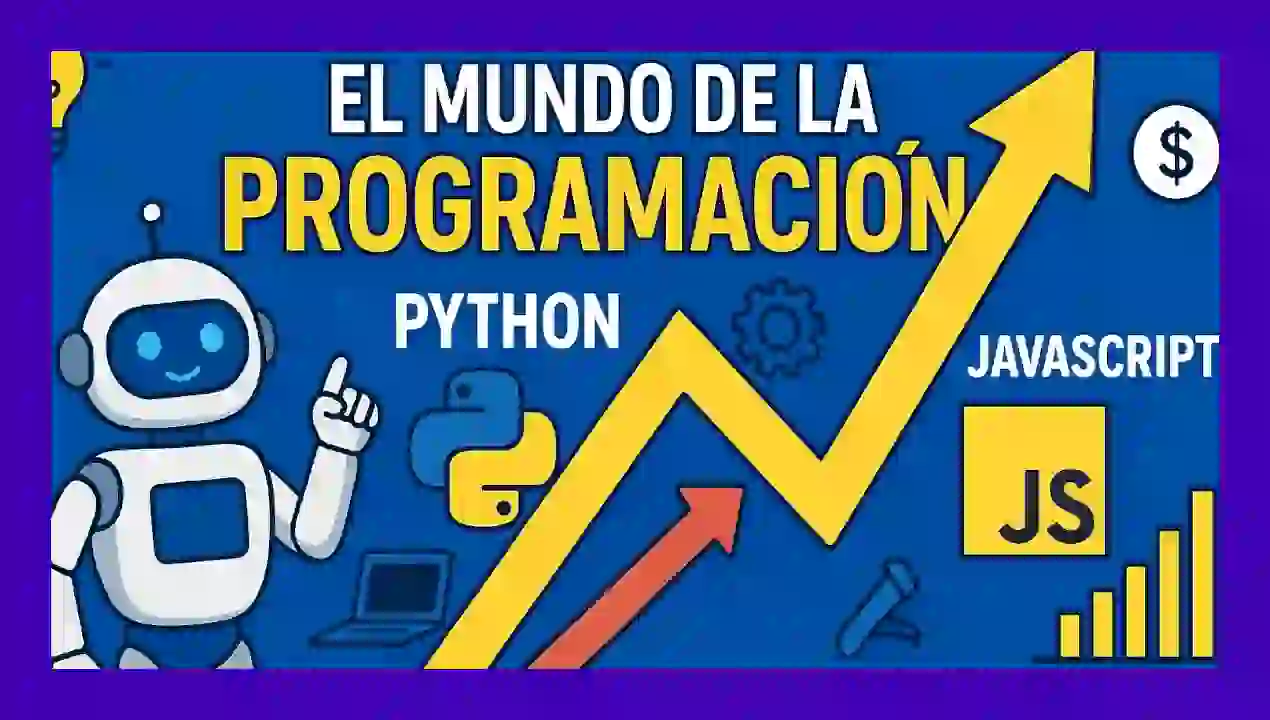Content Index
- The Rise of Python in the Age of AI
- Why is Python the favorite language for artificial intelligence?
- Libraries and Frameworks Driving Its Popularity
- Python vs JavaScript: Trends and Changes in Programming
- The Decline of JavaScript in the Rankings
- What This Change Means for Developers
- The Impact of “vibe Coding” on the Way We Program
- Programming with Prompts: Advantages and Risks
- Why Fundamentals Remain Essential
- Communities and Habits of Developers in the Age of AI
- From Stack Overflow to ChatGPT: A Radical Change
- How This Affects Programming Learning
- The Future of Programming with Python and Artificial Intelligence
- Will Programmers Disappear?
- Short, Medium, and Long-Term Scenarios
- Short term: Python will continue to dominate in AI.
- Conclusion: Learn Python to Master AI from the Fundamentals
Artificial intelligence is transforming the way we code, and in this scenario, **Python** has solidified its position as the great protagonist. Its growth is no surprise: it is a clean, versatile language with an immense ecosystem of libraries that make it perfect for training and deploying AI models.
In my case, Python is my favorite language. I've always loved its clear, expressive, and functional syntax. But what really puts it at the top is its role in the field of artificial intelligence. Today, talking about AI without mentioning Python is practically impossible.
The Rise of Python in the Age of AI
Why is Python the favorite language for artificial intelligence?
The answer lies in the combination of three factors: simplicity, community, and specialized libraries. Python reduces the complexity of programming, allowing both beginners and experts to focus on the logic and models, not the syntax.
When I started experimenting with AI, I discovered how powerful it was to write a few lines of code and see surprising results. That accessibility is what has skyrocketed its adoption.
Libraries and Frameworks Driving Its Popularity
Python has an arsenal of tools that make the work much easier:
- TensorFlow and PyTorch for deep learning.
- Scikit-learn for classic machine learning.
- NumPy and Pandas for data handling.
- Keras for rapid neural network prototyping.
These libraries have turned Python into the de facto standard for AI.
Python vs JavaScript: Trends and Changes in Programming
The Decline of JavaScript in the Rankings
An interesting fact is that while Python is rising, JavaScript has lost positions in international rankings. It went from occupying third place to falling to sixth.
This does not mean that JavaScript will disappear, but it does mean that Python has gained ground in a key area: artificial intelligence, where JavaScript has not been able to compete at the same level.
What This Change Means for Developers
For those of us who code, this change reflects a clear trend: AI, data science, and automation projects demand Python. In my experience, more and more colleagues who used to swear by JavaScript are migrating to Python when it comes to AI.
The Impact of “vibe Coding” on the Way We Program
Programming with Prompts: Advantages and Risks
The so-called vibe codding—writing code using natural language and prompts—has gained popularity. Personally, I don't criticize it: it can be useful and even inspiring. But it also has a significant problem: if you don't understand what you are generating, you become dependent on a "black box."
Why Fundamentals Remain Essential
I always say the same thing: the best way to leverage AI is by knowing what you are asking and understanding the code you receive. Without fundamentals, you remain limited. I've seen many cases of people who get working code but don't know how to adapt or improve it because they don't understand the logic behind it.
Communities and Habits of Developers in the Age of AI
From Stack Overflow to ChatGPT: A Radical Change
Before, when I got stuck on a project, I would spend hours navigating Stack Overflow until I found the answer. Today, it is common to ask an AI model like ChatGPT, Claude, or Gemini directly. The speed and convenience are tremendous, but I also notice that this has reduced interaction in open communities.
How This Affects Programming Learning
This change has a curious effect: new programmers no longer learn by researching among answers and debates but by conversing with AI. That can accelerate the process, but it can also cut short the deep learning that was achieved by reading different approaches and solutions from other programmers.
The Future of Programming with Python and Artificial Intelligence
Will Programmers Disappear?
It's a question I get asked a lot. In the short and medium term, I don't see it happening. Models can generate code, yes, but the creative and solution design part is still in human hands. In the long term, it's an open debate, although personally, I don't imagine a world where programming is just giving orders to a machine.
Short, Medium, and Long-Term Scenarios
Short term: Python will continue to dominate in AI.
Medium term: More automation, but with programmers supervising and refining.
Long term: Perhaps languages will dilute, and programming will become more homogeneous. Even so, I believe we would lose something valuable: the human ingenuity in choosing the right language or framework for each problem.
Conclusion: Learn Python to Master AI from the Fundamentals
AI is changing the way we code, but if one thing is clear to me, it's this: **fundamentals** are what make the difference. It's not enough to know how to generate prompts; the important thing is to understand the logic, create structures, and transform problems into software solutions.
In my case, I always recommend learning Python by programming for real, not just by asking the AI. If you want to do it practically, remember that on my platform you will find courses, books, and resources designed for you to build a solid foundation and become a programmer capable of mastering artificial intelligence with judgment.
